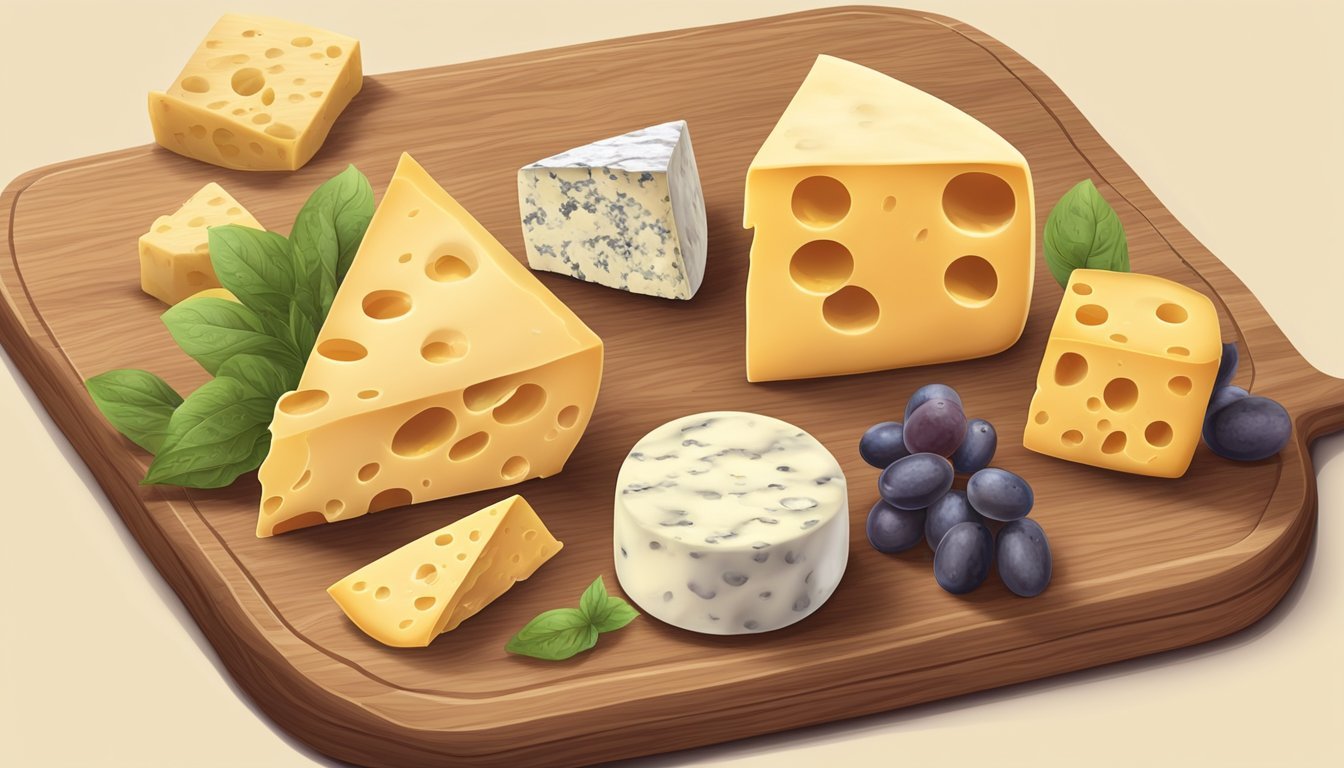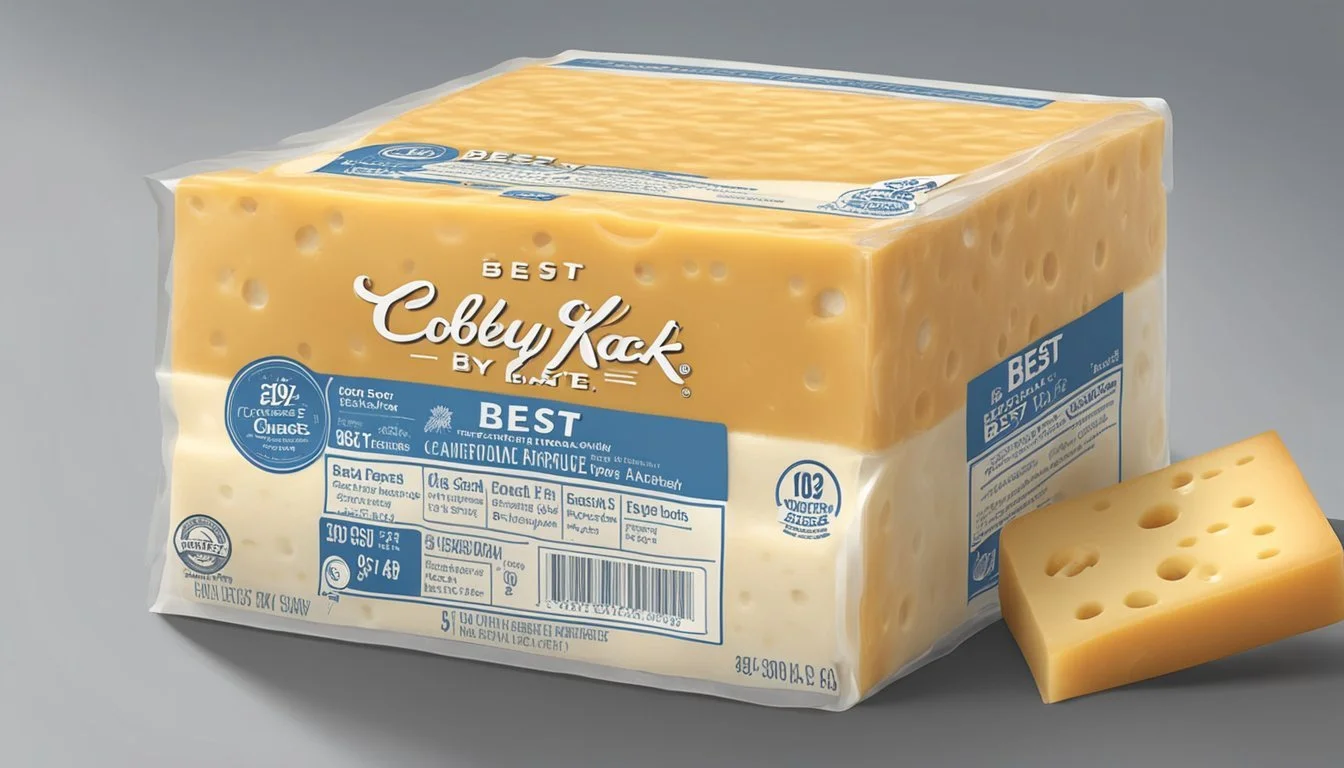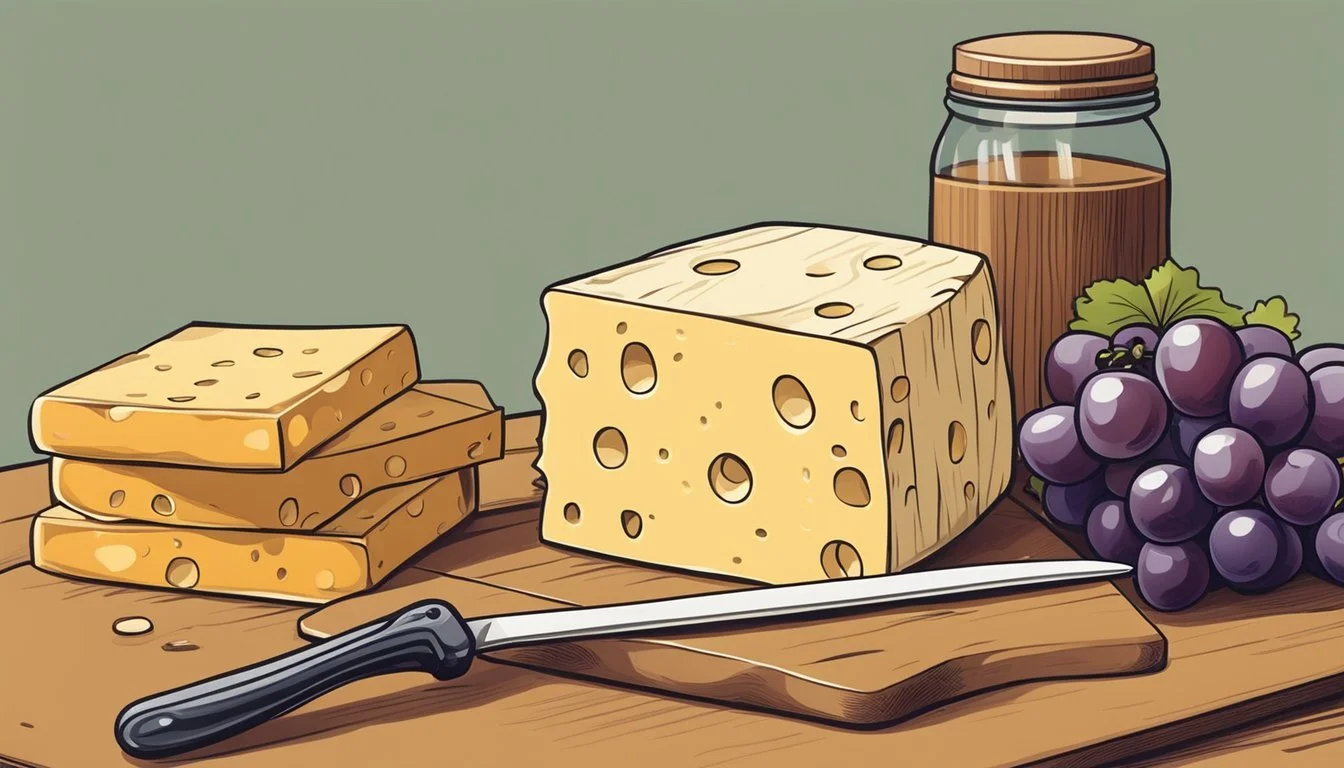How Long Does Colby-Jack Cheese Last?
Understanding Its Shelf Life
The lifespan of Colby-Jack cheese (What wine goes well with cheese?), a staple in many kitchens for its versatility and mild flavor, is contingent upon proper storage and handling. When unopened and stored correctly in the refrigerator, Colby-Jack cheese remains suitable for consumption for approximately 1 to 2 months beyond the date marked on the packaging. This timeframe serves as a guideline for consumers to gauge the freshness and safety of their cheese.
Once the package is opened, the shelf life of Colby-Jack cheese is reduced due to exposure to air and potential contaminants. It is generally recommended that opened Colby-Jack cheese be consumed within 3 to 4 weeks when kept in the refrigerator at a consistent temperature between 35-40°F (1-4°C). To maximize its shelf life, Colby-Jack should be wrapped in wax paper, aluminum foil, or plastic wrap to prevent it from drying out and to maintain its quality.
If Colby-Jack cheese is left out at room temperature, it can safely remain unrefrigerated for about two hours, as suggested by the United States Department of Agriculture. However, if the ambient temperature is above 90°F (32°C), the safe window decreases to one hour. After these periods, harmful bacteria can grow rapidly, increasing the risk of foodborne illness, thus it’s essential to store the cheese properly to ensure its safety and enjoy its full, creamy flavor.
Understanding Colby-Jack Cheese
Colby-Jack cheese, a blend of Colby and Monterey Jack cheeses, is a staple in the cheese world, characterized by its marbled appearance and mild flavor profile. This section delves into its origins and distinctive characteristics.
History and Origin
Colby-Jack cheese originates from the United States with its roots tied to two distinct cheeses: Colby and Monterey Jack. Colby was first made in Colby, Wisconsin in 1885, while Monterey Jack dates back to the Franciscan monks of Monterey, California in the 18th century. Colby-Jack, or "Co-Jack", merges these two American classics to create a harmonious blend.
Characteristics of Colby-Jack Cheese
Colby-Jack cheese is known for its semi-hard texture and distinctive marbled appearance, with a combination of orange and white throughout. The flavor of Colby-Jack is typically mild and slightly buttery, reflecting the characteristics of both Colby, which is similar yet softer than cheddar, and Monterey Jack, which has a more buttery and mildly tangy profile. Its aesthetic appeal and agreeable flavor make it a versatile choice for both cooking and snacking.
Storage Recommendations
Proper storage of Colby Jack cheese extends its shelf life and preserves its quality. This section provides specific guidelines on how to store Colby Jack cheese in the refrigerator and freezer and tips for optimizing its longevity.
Refrigerator Storage
Shelf Life: When stored correctly in the refrigerator, Colby Jack cheese can remain fresh for about 1-2 months.
Conditions: It should be kept in an airtight container or resealable bag to avoid exposure to air and moisture.
If purchased in plastic wrap, one can either keep it in its original packaging or rewrap it in parchment or wax paper, and then place in a plastic bag.
Freezer Storage
Freezer Time: Colby Jack cheese can be frozen to further prolong its shelf life, typically lasting for 6-8 months.
Preparation: Prior to freezing, cut the cheese into portions no larger than 1/2 pound each.
Wrapping: Each portion should be wrapped tightly in heavy-duty aluminum foil or plastic freezer wrap, then placed in a heavy-duty freezer bag to prevent freezer burn and absorption of other flavors.
Optimizing Cheese Longevity
Maximizing the cheese's lifespan involves several key practices:
Always keep the cheese cold; do not leave it at room temperature for more than two hours.
Use clean utensils when handling the cheese to prevent cross-contamination.
For both refrigerator and freezer storage, ensure the storage area is not overcrowded, allowing for proper air circulation.
Shelf Life and Spoilage
Colby-Jack cheese, known for its mild flavor and marbled appearance, typically lasts between 2 to 4 months unopened in the refrigerator, as indicated by the date on its packaging. Once opened, it should be consumed within 3 to 4 weeks to maintain quality. Understanding spoilage indicators is crucial to ensure safety.
Identifying Spoilage Signs
Spoilage signs in Colby-Jack cheese are unmistakable. They include:
Mold: Visible spots or fuzz, which can appear in a variety of colors.
Odor: A sour or ammonia-like smell is a clear indication the cheese is no longer fresh.
Texture: If the cheese feels slimy or excessively hard compared to its normal state.
If signs of mold appear on the cheese's surface, one may cut away the moldy part; at least one inch around and below the mold. However, if mold is widespread or the cheese has deteriorated significantly in other ways, discarding the entire product is the safest option.
Safety of Consuming Aged Cheese
When Colby-Jack cheese has surpassed its best by date, assessing for spoilage is key. Cheese that has spoiled may cause foodborne illnesses, with symptoms such as vomiting or diarrhea. Although aged cheese is often still safe to use past its best by date if properly stored and free from spoilage signs, one should always trust their senses before consumption. If there is doubt about the quality or safety of the cheese, it is better to err on the side of caution and discard it.
Culinary Utilization
Colby-Jack cheese, known for its versatility and balanced flavor, is a staple ingredient in myriad culinary creations. Its ability to melt smoothly and blend with other flavors makes it a popular choice in both classic and inventive recipes.
Common Dishes With Colby-Jack
Colby-Jack cheese, often shortened to Cojack, is frequently used in traditional American dishes. A quintessential ingredient in casseroles, it provides a creamy consistency and appealing look when baked. For a simple yet indulgent meal, macaroni and cheese benefits from the cheese’s perfect meltability, enhancing the dish's texture. Here is how Colby-Jack shines in various dishes:
Casseroles: Melts uniformly to create a rich and gooey topping.
Macaroni and Cheese: Adds a smooth, creamy component when blended with cheddar cheese.
Sandwiches: Delivers a mellow flavor when used as slices in grilled cheese sandwiches.
Quesadillas: Offers a gooey melt that's crucial for this Mexican favorite.
Salads: Shredded Colby-Jack adds a sharp twist to garden and pasta salads.
Soups: Enhances soups with its creamy texture when melted into them.
Nachos: Provides a perfectly melted topping, beloved on this snack staple.
Creative Cooking Ideas
When it comes to creative cooking, Colby-Jack cheese is both adaptable and accommodating to new recipes. Its unique characteristics allow it to be used as a foundation for innovation in the kitchen. Here are specific suggestions for using Colby-Jack in creative ways:
Cooked Dishes: Experiment with adding diced or shredded Colby-Jack to various sauces or as a creamy addition to risottos.
Burgers: A slice of Colby-Jack cheese melts beautifully on a burger, elevating its taste with a creamy texture.
Baked Goods: Incorporate shredded cheese into breads or muffins for added flavor and a moist texture.
Toppings: Upgrade roasted vegetables or baked potatoes with a sprinkle of shredded cheese for a delicious finish.
Employing Colby-Jack in cooking is not only about its complementary nature but also about the subtlety it can bring to a wide range of dishes. Whether it's being melted, shredded, or sliced, Colby-Jack cheese promises to enrich the culinary experience with its mellow and creamy flavor profile.
Nutritional Information
Colby-Jack cheese combines the mild flavors of Colby and Monterey Jack into a creamy texture that's versatile in the kitchen. It is appreciated for both its taste and nutritional benefits, notably as a source of protein and calcium, while also being lower in lactose.
Health Benefits
Colby-Jack cheese is a significant source of calcium, an essential mineral for bone health. Adults can benefit from the protein content, which contributes to muscle maintenance and repair. The creamy texture does not detract from these benefits, making it a pleasurable addition to a balanced diet.
Calcium: Vital for bone and teeth health
Protein: Supports muscle growth and repair
Dietary Considerations
Those monitoring their lactose intake may find Colby-Jack cheese to be a suitable option as it generally has a reduced lactose content compared to other cheeses. However, it still contains moderate levels of sodium and fat, including saturated fat, which should be consumed in moderation.
Lactose: Lower levels than many cheeses
Sodium & Saturated Fat: Monitor intake to maintain a balanced diet
Consumption should be mindful of these factors to adhere to dietary guidelines and personal health goals.
Preservation Techniques
Proper preservation is essential for maintaining the quality of Colby-Jack cheese. Storing the cheese correctly can help prevent mold growth and preserve its color, appearance, and moisture content.
Freezing Process
Freezing can extend the shelf life of Colby-Jack cheese. To freeze the cheese, one should:
Wrap the cheese tightly in cling film or aluminum foil to prevent freezer burn and the absorption of odors from the freezer.
Place the wrapped cheese in a heavy-duty freezer bag or airtight container to preserve the quality.
One should note that the freezing process may alter the texture of Colby-Jack cheese, making it crumblier once thawed.
Thawing After Freezing
The proper way to thaw Colby-Jack cheese is to:
Transfer the frozen cheese to the refrigerator. It should remain in its wrapping to slowly defrost over several hours or overnight.
For quicker thawing, submerging the cheese in cold water, changing the water every 30 minutes, can accelerate the process.
It is not recommended to thaw Colby-Jack cheese in a microwave, as this can unevenly heat the cheese, affecting its texture and moisture content. After being defrosted, the cheese should be consumed within a few days and kept refrigerated when not in use.
Cheese Varieties Comparison
When comparing cheese varieties, factors such as texture, flavor, and aging process play pivotal roles in distinguishing each type of cheese. These characteristics influence the cheese's longevity and how it should be stored.
Colby vs Cheddar Cheese
Colby is a semi-hard cheese originating from Colby, Wisconsin. Unlike cheddar, it is produced through a washed-curd process that halts the acid development, giving it a milder and less tangy flavor than cheddar. Colby's texture is smooth and creamy, while Cheddar is known for a sharper taste that intensifies with aging and a firmer texture. Cheddar can age and develop complex flavors over months to several years, which also allows it to be stored longer than Colby due to its lower moisture content and resulting reduced risk of bacteria growth.
Colby-Jack and Other Marbled Cheeses
Colby-Jack, a fusion of Colby and Monterey Jack cheese, is a marbled cheese with a distinctive orange and white appearance. It is known for being milder and creamier than Colby, with Monterey Jack contributing to its smooth, creamy texture. This cheese tends to have a higher moisture content compared to hard cheese like cheddar, which may make it more susceptible to bacterial growth, so it often doesn't last as long. Other marbled cheeses, such as Swiss with its signature holes and mild nuttiness, offer varying levels of hardness and flavor profiles but share the commonality of distinctive markings and a balance of flavors owing to the blend of different cheeses.
Packaging and Handling
Proper packaging and handling are crucial in preserving the quality and extending the shelf life of Colby-Jack cheese. The following subsections delve into best practices for packaging and managing this popular cheese variant.
Maintaining Quality in Packaging
Packaging: To ensure Colby-Jack cheese maintains its quality, it should be kept in its original packaging until it is ready to be used. This approach helps in preventing exposure to air, which can accelerate the aging process and lead to the development of mold. The unopened Colby-Jack cheese, when refrigerated properly, can generally last about 1 to 2 months. When dealing with shredded Colby-Jack cheese, the unopened package can last for about 1 week past the "Sell By" date if kept refrigerated consistently.
Moisture Content: The packaging material for Colby-Jack cheese is typically designed to retain the right moisture content, which is essential in preserving the cheese’s desirable properties like its semi-soft texture and mild flavor.
Handling and Slicing Techniques
Handling: Once opened, Colby-Jack cheese should be handled with care. Hands should be clean to prevent contamination, and the cheese should be sliced using a sharp, clean knife to ensure a smooth cut and prevent crumbling of the curds. Refrigerated Colby-Jack cheese that has been opened should be tightly wrapped in plastic wrap or aluminum foil after handling. This is important to prevent moisture loss and protect the cheese from absorbing odors from other foods, which can alter its flavor and appearance.
Cold Water: If the cheese needs to be chilled quickly for slicing, one may briefly submerge the cheese in cold water to firm it up, making handling and slicing easier. This technique helps to cut clean slices without altering the cheese's structure.
Remember, the appearance of the cheese should remain consistent in color without any signs of drying or cracking, which indicates proper packaging and handling techniques are being followed.
Pairing and Serving Suggestions
Colby-Jack cheese, with its smooth texture and mild flavor, offers versatile pairing options suited to a range of palates. It’s a cheese equally at home in a culinary creation or on a snacking platter.
Ideal Food Pairings
Salads: Colby-Jack’s light and creamy characteristics make it a natural complement to crisp, fresh salads.
Ham: The cheese has a subtle sweetness that pairs beautifully with the savory notes of ham, ideal for sandwiches or breakfast dishes.
Crackers: Pair with a variety of crackers for simplicity; its smooth texture contrasts nicely with the crunch.
Tomatoes: A slice of Colby-Jack goes well with tomatoes, enhancing dishes such as burgers and bruschettas.
Pears: For a sweet and savory snack, Colby-Jack cheese and ripe pears are a delightful match.
Cheese Platter Recommendations
When crafting a cheese platter, Colby-Jack should be a key player due to its crowd-pleasing qualities.
Crackers and Breads: Offer a selection of whole grain crackers and crusty breads to highlight the cheese’s flavor and texture.
Fresh Fruit: Include slices of pears or apples to accentuate the mellow tone of the cheese.
Cured Meats (What wine goes well with cured meats?): Thinly sliced ham or salami provides a savory contrast to the cheese’s smoothness.
Vegetables: Add cherry tomatoes or sweet peppers for a pop of color and a burst of freshness.









